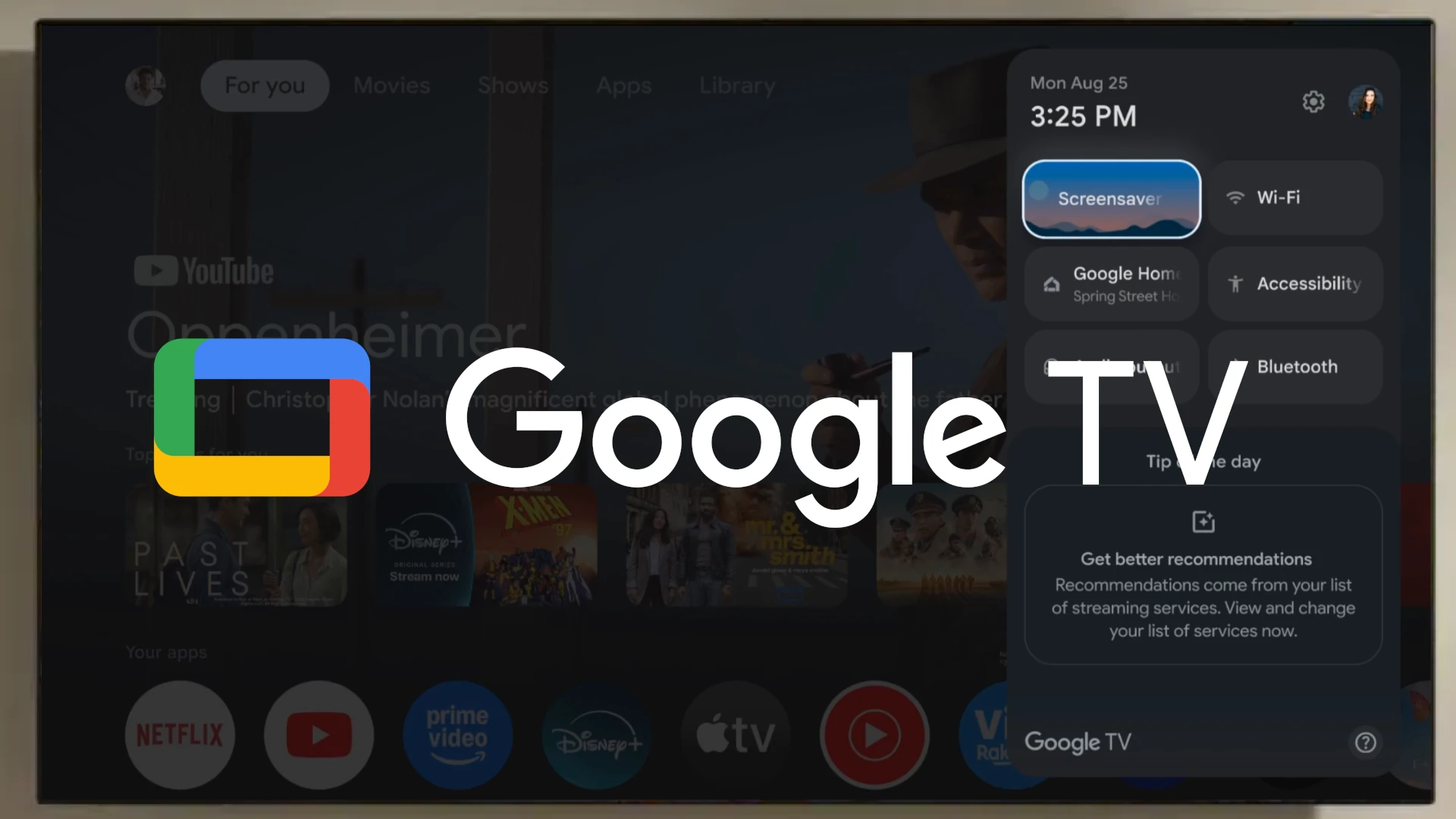Google is enhancing its Google TV platform by integrating Gemini AI, which is set to launch in 2025. This integration will improve voice interactions and user experiences, focusing on conversational ease, smart home integration, and immersive features. With this strategy, Google aims to gain a competitive edge in the AI landscape, promising significant innovations for everyday life.
At this year’s CES, Google shared a preview of the new AI capabilities for Google TV that utilize their Gemini models, making interactions with your TV more intuitive and helpful. You and your family will be able to gather around and engage in natural conversations with your TV, simplifying the process of searching through your media. You will also be able to ask questions about topics such as travel, health, space, history, and more, with videos provided in the results for added context.
Additionally, the Gemini model on Google TV allows you to create customized artwork as a family, control your smart home devices while your TV is in ambient mode, and receive an overview of the day’s news. These features are set to begin rolling out later this year on select Google TV devices.
Gemini’s Impact on the Future of Television

Smarter Interactions with Your TV
Google TV is getting a big upgrade with Gemini AI. This means you’ll talk to your TV in a more natural way. Forget robotic commands. Gemini lets you have real conversations. Ask for movies with specific actors, get details on sports scores, or even ask questions about what you’re watching. You won’t need to say “Hey Google” before every question, making the whole experience much smoother.
Finding What You Want, Faster
Searching for shows and movies becomes much easier with Gemini. Instead of typing in titles, you can use regular language. Say things like “Find comedies with strong female leads” or “Show me documentaries about space.” Gemini understands what you mean and finds the right content quickly. This is a big improvement over current voice search features.
A More Helpful TV Experience
Gemini doesn’t just help you find stuff to watch. It makes your TV a central hub for helpful information. Imagine asking “What’s the weather like today?” and your TV shows you a detailed forecast. Or say “Show me local restaurants” and get a list with reviews. Gemini uses up-to-date info to give you useful answers, right on your TV screen.
Better Control of Your Home
If you have smart home devices, Gemini makes controlling them from your TV much simpler. You can say “Dim the lights” or “Show me the front door camera” without needing a separate app or remote. This makes your TV a central command center for your entire home. It simplifies daily tasks and makes managing your smart home easier.
A New Look for Your TV
Gemini also brings a new look to Google TV. When you’re not watching anything, your TV can display art, photos, or even AI-generated images. It can also show you useful widgets like weather, news, and traffic. Proximity sensors will trigger an on-screen hub when you approach your TV, providing easy access to information. This makes your TV more useful and engaging, even when it’s not actively playing content.
Gemini Features on Google TV
| Feature | Benefit |
|---|---|
| Natural Voice Interactions | More conversational and fluid control |
| Improved Content Search | Easier and faster searching with natural language |
| Helpful Information Access | Provides up-to-date information like weather and local listings |
| Smart Home Control | Centralized control of connected devices |
| Enhanced Ambient Experience | Personalized widgets and dynamic displays |
Short Summary:
- Gemini AI is designed to improve conversational interactions on Google TV.
- The new platform will utilize proximity sensors for an ambient experience.
- Google is under pressure to reclaim its status in the AI landscape, as competitors like Meta and Apple advance.
In an era overflowing with technological advancements, Google is taking bold steps to reassert its influence in the competitive landscape of artificial intelligence. At the 2025 Consumer Electronics Show (CES), the company unveiled an exciting update to Google TV, incorporating the highly anticipated Gemini AI. This move is expected to revolutionize user interaction with the platform, particularly through enhanced voice capabilities that promise a more natural conversation experience.
Google CEO Sundar Pichai expressed urgency during the company’s year-end strategic meeting, noting that while Google had previously fallen behind rivals like OpenAI with its ChatGPT model, the introduction of Gemini aims to position the tech giant back at the forefront of AI innovation. “In history, you don’t always need to be first, but you have to execute well and really be the best in class as a product,” he stated. “I think that’s what 2025 is all about.”
Gemini AI, which has been in development and testing phases, aims to surpass its predecessors by offering more interactive responses and a deeper understanding of user intent. Unlike existing systems that require specific command phrases, Gemini will allow users to interact in a conversational style, significantly enhancing usability. For instance, instead of rigid directives, users can ask Google TV nuanced questions, making the experience feel more human-like.
“2025 will be critical. The stakes are high. These are disruptive moments. In 2025, we need to be relentlessly focused on unlocking the benefits of this technology and solve real user problems,” Pichai emphasized.
With the advent of Gemini AI, Google TV is expected to integrate proximity sensors that can detect user presence in a room. This feature will enable the TV to automatically activate ambient content, like photo slideshows or personalized dashboards, creating a seamless and engaging environment. Users entering a room will be greeted with dynamic content, while the system will intelligently adjust based on their proximity to the screen. “This is Google TV’s take on the ambient experience, one that mimics the Nest Hub and brings an advanced touch to how users interact with their content,” said an insider source familiar with the project.
The integration of Gemini AI marks a shift from traditional smart TV functionality to an intelligent ecosystem geared toward user-centric experiences. Leveraging Google’s robust infrastructure—backed by significant financial resources—the company aims to craft a compelling ecosystem that integrates entertainment, information, and smart home control. Users will be able to issue commands not just for content discovery, but for smart home management directly through their TV interface.
From Assistant to Assistant: The Enhanced Feature Set
The upcoming Google TV interface will connect with various Google services, allowing for expanded functionalities that extend well beyond video playback. With Gemini, users can initiate personalized routines, such as monitoring the weather or controlling smart home devices, directly from the TV. The system is set to adopt a more relaxed approach to user interaction. In addition to simple queries like “What’s playing tonight?” users can ask broader questions such as “Can you recommend a family-friendly movie?” The AI will draw upon YouTube reviews, sentiment analysis, and content recommendations to provide tailored suggestions.
In addition to improving conversational capabilities, Google is enhancing the visual elements of the platform. Gemini will bring AI-generated art screensavers, allowing the TV to display beautiful, contextually relevant visuals—it’s akin to the AI wallpapers used in Google’s Pixel smartphones. Images created through Generative AI will give users a unique experience each time they turn on the TV, making even idle moments engaging.
“The TV knows when you’re in the room and what you’re interested in. It will be able to show you the weather, news briefs, and even take you into an immersive world of media that you might enjoy,” said a Google engineer working on the project.
Competitive Landscape
The shift toward AI-driven smart home integration isn’t solely the domain of Google. Meta has been ramping up its investments in AI, introducing its AI assistant across various products, from the Ray-Ban smart glasses to the Orion headset. Meanwhile, Apple has been quietly developing its AI capabilities, embedding them within its existing ecosystem for services like Siri, leading users to wonder how these competitors will respond to Google’s advancements with Gemini.
For Apple, the strategy may seem more measured, but the potential for redefining consumer experiences is evident. Apple’s commitment to maintaining a unique user experience underscores the importance of creating seamless functionality, particularly if generative AI is integrated within its tightly held ecosystem. The stakes in this competitive race extend beyond mere market share; the ultimate outcome could possess enormously far-reaching consequences on the standards and platforms that will govern user experiences in the coming decade.
As Google prevails with Gemini, it signals a reawakening for the tech giant, presenting the urgency to uphold user trust in the brand’s capabilities. A revived Google TV experience could be the cornerstone in establishing Google’s renewed dominance in the AI space, rekindling the connection that placed it at the helm of innovation.
A Promising Future
With the introduction of Gemini, Google echoes the message that while timing in tech is essential, executing on a grand scale is paramount. “It’s crucial that we internalize the urgency,” Pichai warned. The implications of AI advancement and their use in consumer technology present vast possibilities for transforming day-to-day living.
As the deadline approaches for the expected 2025 rollout of new Google TV hardware, anticipation continues to grow. Consumers are eager to see how the combination of Gemini AI and the next-generation Google TV will reshape the landscape of home entertainment. Ultimately, the successful merging of AI and television could not only redefine the user experience but also mark a watershed moment in digital interaction across devices.
In summary, Google’s bold steps towards integrating Gemini with Google TV appear to provide substantial enhancements to voice interaction, user experience, and value delivery. As the tech industry charges into the future, the spotlight remains on how effectively Google can capitalize on its rich capabilities and restore its crown as a leader in the AI domain.







